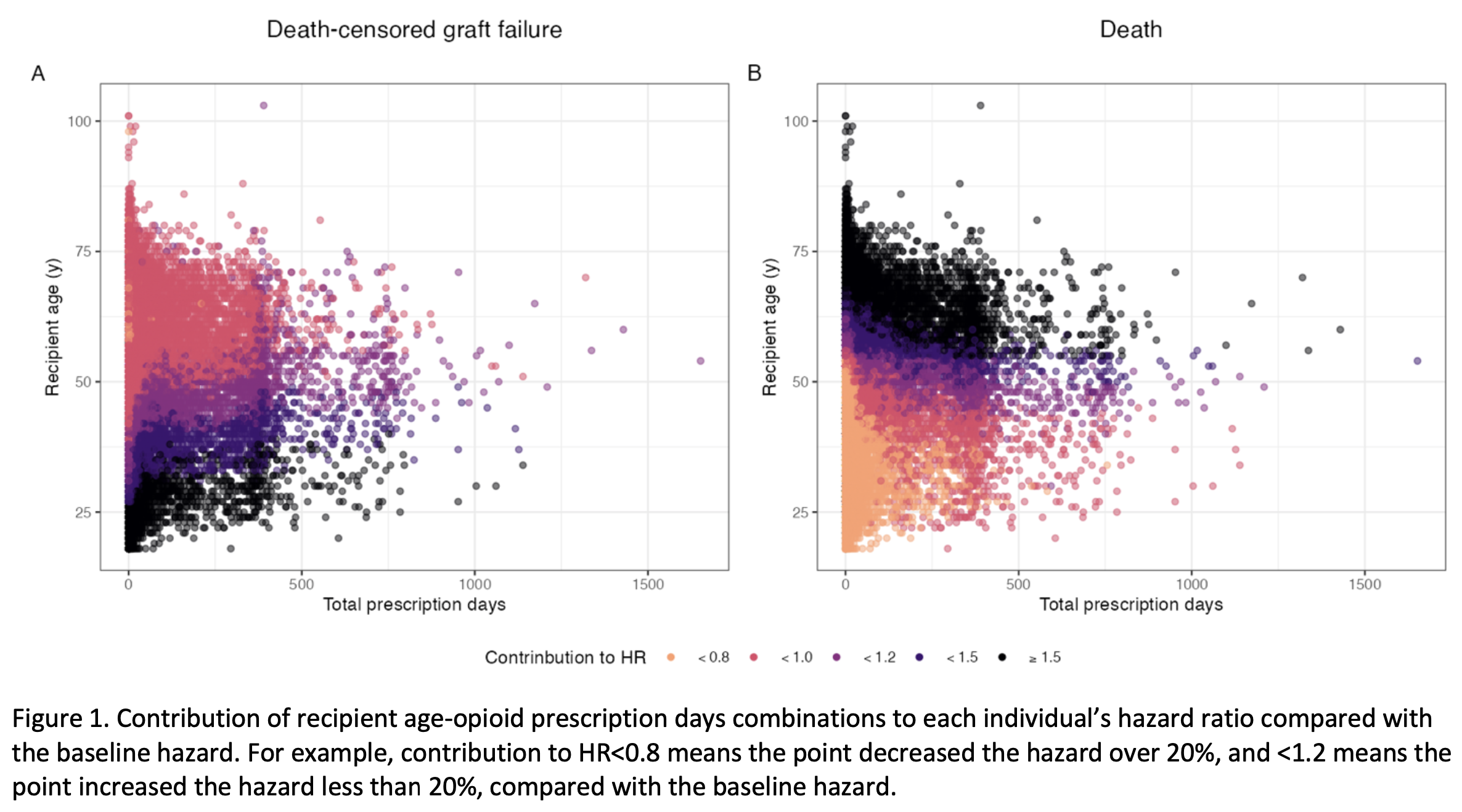Prescription Opioid Use May be More Detrimental to Younger Kidney Transplant Recipients: A Machine Learning Approach
1Johns Hopkins, Baltimore, MD, 2Saint Louis University, St. Louis, MO
Meeting: 2022 American Transplant Congress
Abstract number: 151
Keywords: Age factors, Graft failure, Kidney transplantation, Mortality
Topic: Clinical Science » Pharmacy » 30 - Non-Organ Specific: Clinical Pharmacy/Transplant Pharmacotherapy
Session Information
Session Name: Non-Organ Specific: Clinical Pharmacy/Transplant Pharmacotherapy
Session Type: Rapid Fire Oral Abstract
Date: Sunday, June 5, 2022
Session Time: 5:30pm-7:00pm
 Presentation Time: 5:50pm-6:00pm
Presentation Time: 5:50pm-6:00pm
Location: Hynes Room 312
*Purpose: Prescription opioid use requires special attention in kidney transplant (KT) recipients considering that it increases the risk of death and graft loss. However, the implication of opioid use differing by recipient age has been barely investigated despite inconsistent opioid use patterns by age. We aimed to test whether pre-transplant opioids had a differential effect on post-KT outcomes between older (≥65y), middle-aged (50-64y), and younger (<50y) KT recipients using machine learning (XGBoost).
*Methods: Using USRDS, we selected adult (≥18y) first-time kidney-only transplants in 2007-2018 who had Medicare Part D for one year before transplant. We summed up all opioid prescription days within a period of one year before transplant, allowing multiple agents use and overlapped prescription periods. Outcomes of interest were death-censored graft failure (DCGF) and mortality. Using XGBoost, we quantified the contribution of prescription days-recipient age combinations to the hazard of these outcomes. For example, the contribution less than one means the combination does not increase the hazard over the baseline hazard. To confirm the results from the XGBoost model, we used Cox proportional hazard models, including an interaction term of recipient age and binary opioid use.
*Results: We identified 49,394 transplants, and 21.1% were older recipients. The median follow-up was 4.5 or 5.1 years for DCGF or death, respectively. For both outcomes, higher prescription days were associated with a higher hazard in younger recipients, whereas it was less pronounced in older and middle-aged recipients (Figure 1). The Cox models confirmed this pattern. For example, for recipients with a pre-KT opioid prescription, the hazard of DCGF increased by 1.21-fold (95% CI: 1.14-1.28) in younger recipients, but there were no associations in older and middle-aged recipients (HR: 1.03 [95% CI: 0.93-1.14], 1.05 [95% CI: [0.98-1.13], interaction p<0.01, Table 1).
*Conclusions: Prescription opioid use before KT might have more deleterious effects in younger recipients. Tailored post-KT care may be necessary for this age group with opioid prescription history.
To cite this abstract in AMA style:
Kim J, Bae S, Ahn J, Lentine K, Segev D, McAdams-DeMarco M. Prescription Opioid Use May be More Detrimental to Younger Kidney Transplant Recipients: A Machine Learning Approach [abstract]. Am J Transplant. 2022; 22 (suppl 3). https://atcmeetingabstracts.com/abstract/prescription-opioid-use-may-be-more-detrimental-to-younger-kidney-transplant-recipients-a-machine-learning-approach/. Accessed February 20, 2026.« Back to 2022 American Transplant Congress


